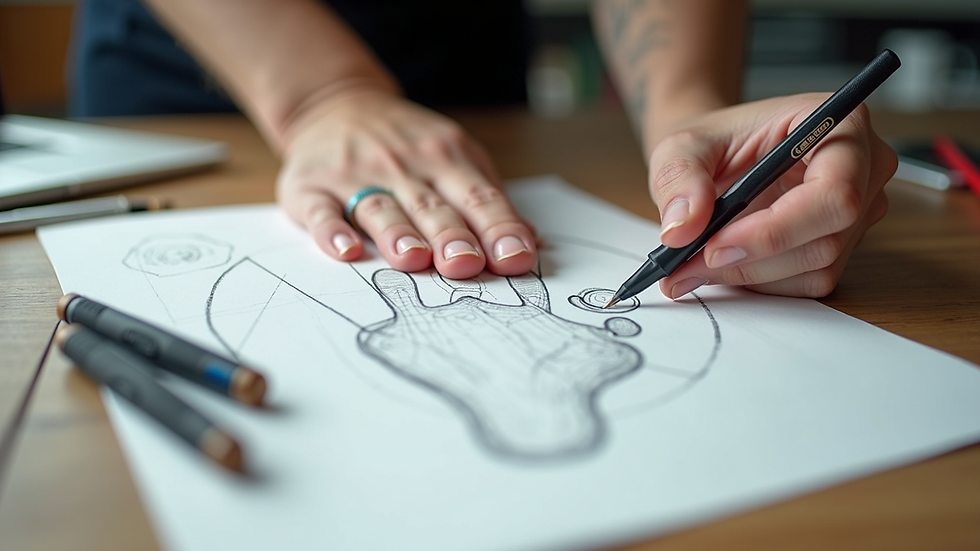Accurate Foot Measurement for Perfect Shoe Fit
- francescosensiniit
- Sep 8, 2025
- 4 min read
Finding the right shoe size is more than just picking a number off the box. It’s about comfort, support, and style all coming together. When shoes fit well, you feel confident and ready to take on the day. But if they don’t, discomfort and even injury can follow. That’s why accurate foot fitting tips matter. They help you choose shoes that truly match your feet.
Shoes that fit perfectly support your feet in all the right places. They prevent blisters, reduce fatigue, and keep your posture balanced. Whether you’re hitting the streets of New York or strolling through Boca Raton, the right fit makes a difference. Let’s explore how to get it right every time.
Why Accurate Foot Fitting Tips Matter
Many people overlook the importance of measuring their feet properly. Feet can change size and shape over time due to factors like age, weight, and activity level. Wearing shoes that don’t fit well can cause pain, calluses, or worse. Accurate foot fitting tips help you avoid these problems.
When you know your exact foot size and shape, you can shop smarter. You’ll pick shoes that feel good from the first step. This is especially true for sneaker enthusiasts who want both style and comfort. A well-fitted sneaker enhances performance and keeps your feet happy.
Here are some reasons why accurate fitting is essential:
Prevents foot pain and injuries
Improves walking and running comfort
Extends the life of your shoes
Enhances overall foot health
Taking the time to measure your feet properly is a small effort with big rewards.

Accurate Foot Fitting Tips You Can Use Today
Getting the right fit starts with knowing what to look for. Here are some practical tips to help you find shoes that fit perfectly:
Measure your feet at the end of the day
Feet tend to swell slightly as the day goes on. Measuring them in the evening gives you the most accurate size.
Wear the socks you plan to use with the shoes
If you usually wear thick socks with your sneakers, measure your feet while wearing them.
Check both feet
One foot is often slightly larger. Fit your shoes to the bigger foot.
Allow some room for movement
Your toes should have about a half-inch of space from the shoe’s end. This prevents cramping.
Test the width
Shoes should feel snug but not tight. If your foot feels squeezed, try a wider size.
Walk around before buying
Take a few steps to see how the shoe feels in motion.
Consider the shoe’s purpose
Running shoes, casual sneakers, and dress shoes fit differently. Choose based on your activity.
By following these tips, you can avoid common fitting mistakes and enjoy your shoes longer.

How to measure foot size?
Measuring your foot size at home is simple and accurate if done right. Here’s a step-by-step guide:
Gather your tools
You need a piece of paper larger than your foot, a pencil, and a ruler or tape measure.
Prepare the surface
Place the paper on a hard, flat floor. Avoid carpet or uneven surfaces.
Trace your foot
Stand on the paper with your full weight. Keep your foot flat and still. Trace around your foot with the pencil held straight up.
Mark the length and width
Draw a straight line from the heel to the tip of your longest toe. Then mark the widest part of your foot.
Measure the lines
Use the ruler to measure the length and width in inches or centimeters.
Compare with size charts
Use the measurements to find your shoe size on a reliable chart. Remember, sizes vary by brand.
Repeat for the other foot
Measure both feet and use the larger measurement.
This method gives you a clear idea of your foot dimensions. It’s a great starting point before trying on shoes.
For more detailed guidance, check out this foot measurement resource.

Common Mistakes to Avoid When Fitting Shoes
Even with the best intentions, some errors can lead to poor shoe fit. Watch out for these pitfalls:
Buying shoes without trying them on
Online shopping is convenient, but always check return policies. If possible, try shoes in-store first.
Ignoring foot changes
Pregnancy, weight gain, or aging can alter foot size. Measure regularly.
Choosing shoes based on style alone
A trendy shoe won’t help if it hurts your feet.
Not considering shoe break-in time
Some shoes need a few wears to soften. But they shouldn’t be painful from the start.
Overlooking arch support
Flat shoes may look good but can cause discomfort if your arch needs support.
Avoiding these mistakes saves you money and discomfort.
Tips for Sneaker Enthusiasts: Finding the Perfect Fit
Sneaker lovers know that fit is key to enjoying their collection. Here are some extra tips tailored for sneaker fans:
Know your brand’s sizing quirks
Some brands run small or large. Research before buying.
Consider sneaker materials
Leather stretches over time, while synthetic materials hold shape.
Use insoles if needed
Custom or cushioned insoles can improve fit and comfort.
Keep your feet dry
Moisture can cause slipping inside the shoe. Use moisture-wicking socks.
Rotate your sneakers
Wearing the same pair daily wears them out faster. Rotate to extend life.
By paying attention to these details, you’ll enjoy your sneakers longer and feel great wearing them.
Taking the time to measure your feet and follow accurate foot fitting tips makes all the difference. Shoes that fit well support your lifestyle and keep you comfortable. Whether you’re walking the streets of Dallas or exploring Fort Lauderdale, the right fit helps you move with ease and confidence. Remember, your feet deserve the best care. Start with proper measurement and choose wisely. Your perfect pair is waiting.



Comments